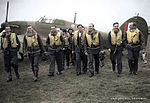| Revision as of 17:45, 21 January 2005 editEmax (talk | contribs)9,958 editsmNo edit summary← Previous edit | Revision as of 02:07, 3 April 2005 edit undoGrutness (talk | contribs)Autopatrolled, Administrators316,318 editsmNo edit summaryNext edit → | ||
| Line 80: | Line 80: | ||
| * ] | * ] | ||
| {{ |
{{East-Slavic-history-stub}} | ||
| ] | ] | ||
| ] | ] | ||
Revision as of 02:07, 3 April 2005
The correct title of this article is Battle of Racławice. It appears incorrectly here due to technical restrictions.Template:Battlebox The Battle of Racławice was one of the first battles of the Polish Kościuszko Uprising against Russia. It was fought on April 4, 1794 near the village of Racławice in Lesser Poland.
The Polish forces prepared for the battle were relatively small. The Polish Order of Battle was as follows:
| unit | supperior | soldiers | |||||||||||
|---|---|---|---|---|---|---|---|---|---|---|---|---|---|
| 2 battalions | Infantry Regiment of Czapski | 400 bayonettes | |||||||||||
| 2 battalions | Infantry Regiment of Wodzicki | 400 bayonettes | |||||||||||
| 2 battalions | Infantry Regiment of Ożarowski | 400 bayonettes | |||||||||||
| 1 battalion | Infantry Regiment of Raczyński | 200 bayonettes | |||||||||||
| 10 squadrons of cavalry | under Antoni Madaliński | 400 sabres | |||||||||||
| 10 squadrons of cavalry | under Magnet | 400 sabres | |||||||||||
| 4 cavalry squadrons | under Biernacki | 160 sabres | |||||||||||
| 2 auxiliary cavalry squadrons | Duchy of Wurtemberg | 80 sabres | |||||||||||
| 2440 men altogether | |||||||||||||
In addition, Lesser Poland fielded also approximately 2 000 peasants armed with war scythes and pikes, as well as 11 cannons. The outcome of the battle was a tactical Polish victory, with Kościuszko defeating the numerically supperior enemy. However, his forces were too small to start a successful pursuit and the Corps of Gen. Denisov evaded destruction and continued to operate in Lesser Poland.
The victory was subsequently promoted in Poland as a major success and helped in starting the Kościuszko Uprising in other areas of Poland and the Warsaw Uprising of 1794. Also, the participation of peasant volunteers was seen by many as the starting point of the political evolution of Polish peasantry from serfs to members of the nation.
In honour of the bravery of the peasants, after the battle Kościuszko paraded in front of his troops in sukmana, a traditional attire worn in Lesser Poland. Both the red cap worn by his soldiers and the home-made war scythes were later featured on the emblem of the 303rd Polish Fighter Squadron fighting in the Battle of Britain.

See also
This East Slavic history-related article is a stub. You can help Misplaced Pages by expanding it. |